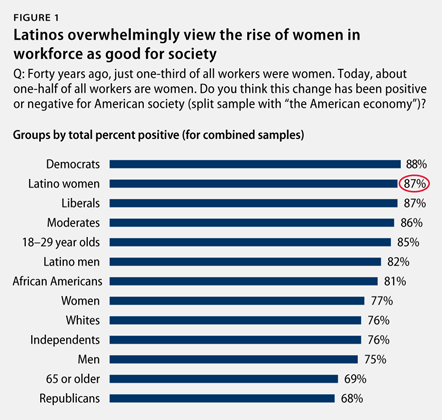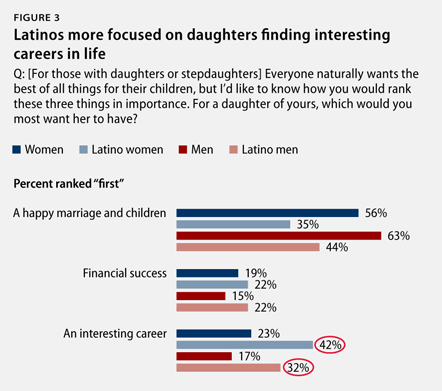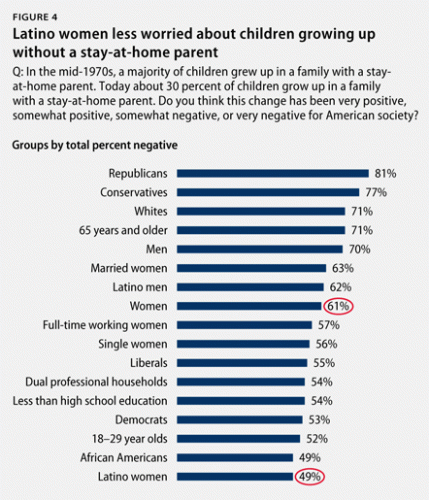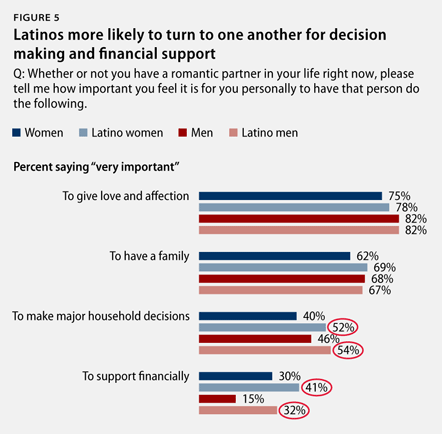Teresa L.-M. sent us a link to an article at Color Lines about a survey of 3,413 people conducted by several groups, including Time magazine and the Center for American Progress, about attitudes toward a variety of issues including changes in women’s work and family roles. Overall, we see that every group said that women’s increased participation in the paid workforce has been good for the U.S., but not surprisingly, some groups were more enthusiastic than others:
This includes those who said it has been “somewhat” or “very” positive. The % for Latinas was highlighted in the original because the memo focused on the fact that Latinos and Latinas, despite stereotypes that they hold more “traditional” gender attitudes, reported more positive feelings about increased workforce participation than did men and women as a whole. Hispanics were somewhat oversampled — that is, more were included than you would expect relative to their proportion in the U.S. population — because the organizations conducting the survey wanted to get more detailed information about Latino/a attitudes. The results indicated that “Latino attitudes were basically in line with those of other groups on nearly every indicator in the survey. Some minor differences did emerge in terms of the intensity of these beliefs and the degree of consensus about an issue.”
Also, obviously the categories above are not mutually exclusive, they just illustrate some interesting differences when you sort on various characteristics.
One area where Latinos/as differed was that they were more likely to report having an “interesting career” as the most important thing for their daughters to have, and less likely to say marriage and family is the most important, compared to all men and women, which is the opposite of what stereotypes of Latinos and Latinas would predict:
But I can’t help but note the wording there: “Everyone naturally wants the best of all things for their children…” That’s sloppy survey writing there, because it’s leading — it implies that a certain attitude or desire is universal and normative, and implies that everyone would agree that the three items they include in the question are examples of “the best.” It’s not that I’m saying most parents want their daughters to have miserable marriages or shitty jobs they hate. But you always want to be careful about wording questions in ways that take beliefs or values for granted, and thus set up a situation where contradicting them puts the respondent in the position of feeling deviant or fearing disapproval from the interviewer. I don’t know that in this particular example, that wording would have a huge impact on responses, since participants had to rank 3 specific items relative to one another. But I’d be very concerned if they had then been asked how important each item was (rather than asked to rank them), since the wording might lead people to rate items more highly than they would otherwise, because that’s what parents “naturally” want for their kids.
Anyway, moving on. Latinos/as were less concerned about children growing up without a full-time stay-at-home parent than were men and women overall, with Latinas expressing significantly less negative attitudes than women overall and Latino men (this includes those who answered “very” or “somewhat” negative):
Back to methodological quibbling, this next graph is a great example of slippage between what the graph shows and what the heading claims it shows. As we see, the title says it indicates that Latinos are “more likely to turn to one another for decision making and financial support”:
But that’s not what the data are about at all. The question wording makes it clear this is both hypothetical (including people who don’t have a romantic partner and thus may be answering based on what they suppose would be true if they did) and is about how they value these things (“how important you feel it is for you personally…”), which is very different than if they regularly do them. The fact that you feel that it’s very important to have a romantic partner who provides financial support does not mean you are, in fact, turning to another person for financial support.
Of course, the heading for the table was written after the data were gathered and analyzed, and it doesn’t necessarily indicate that the data themselves are problematic. And yet, along with the wording issue above — and these are just two things I noticed in the memo that summarizes a few of the findings — it makes me a bit hesitant. The topic is interesting, and the results, which seem to undermine stereotypes about Latinos/as, would be great to use…except the methodological issues are overshadowing what might be perfectly valid, useful, and insightful findings. So ultimately, I present the images here less as information on attitudes about women’s roles and more as a cautionary tale.
And, you know, feel free to let me know if you think I’m over-reacting.





Comments 9
Philip Cohen — July 15, 2010
Thanks -- I don't think you're over-reacting.
Another common issue here is the differences between different groups of Latinas. Women's employment, and the things its associated with, differ between Mexican, Puerto Rican, and Cuban women (to name the largest groups in 2000 at least) - and by citizenship status / timing. Attitudes aren't my specialty, but I'd be surprised if attitudes didn't similarly vary. My colleague Jen'nan Read and I looked at the employment stuff here: http://www.unc.edu/~pnc/SF07.pdf.
Jody Agius Vallejo — July 15, 2010
I agree with you and Philip. In addition to the fact that the survey portrays Latinos as a monolithic population in terms of national origin and generational status, Latino attitudes also vary by social class.
Sarah — July 15, 2010
There's another problem with Figure 5--the wording choice in the heading suggests that Latino men and women will only have LATINO partners. The heading states, "Latinos more likely to turn to ONE ANOTHER." That's not what the question is about, either--it's about turning to *a* romantic partner, not *a Latino* romantic partner.
Annalise — July 15, 2010
No great contribution here, I just wanted to say thank you - I love these posts where methods of gathering and presenting data are discussed. They've taught me a lot about how to look more critically at data, which is something I never learned well anywhere else. I think it's helped me be less of a passive consumer of information and more thoughtful and involved, on the internet especially - so thank you!
Sorry if I come off as a suck up...
nina — July 16, 2010
the idea that a white person from argentina, a black person from cuba or the dominican republic, an indigenous person from peru and a us born puerto rica would because of "latinidad" share the same attitudes is ludicrous
i'd say the studies, to some extent, are useless because they are studying many many groups under the guise of studying "latinos"
Steverogers — August 22, 2023
Do you Know Who is the Lucky person in the world? Hey you you are the lucky person in the world. because you were eligible to take part in the My Wawa Survey. Participate in the survey at https://www.mywawavisit.one/ and get a chance to win a $25 Gift card & $75 Free Hogies for a year.
Steverogers — August 22, 2023
Do you Know Who is the Lucky person in the world? Hey you you are the lucky person in the world. because you were eligible to take part in the My Wawa Survey. Participate in the survey at Wawa Customer Satisfaction Survey and get a chance to win a $25 Gift card & $75 Free Hogies for a year.